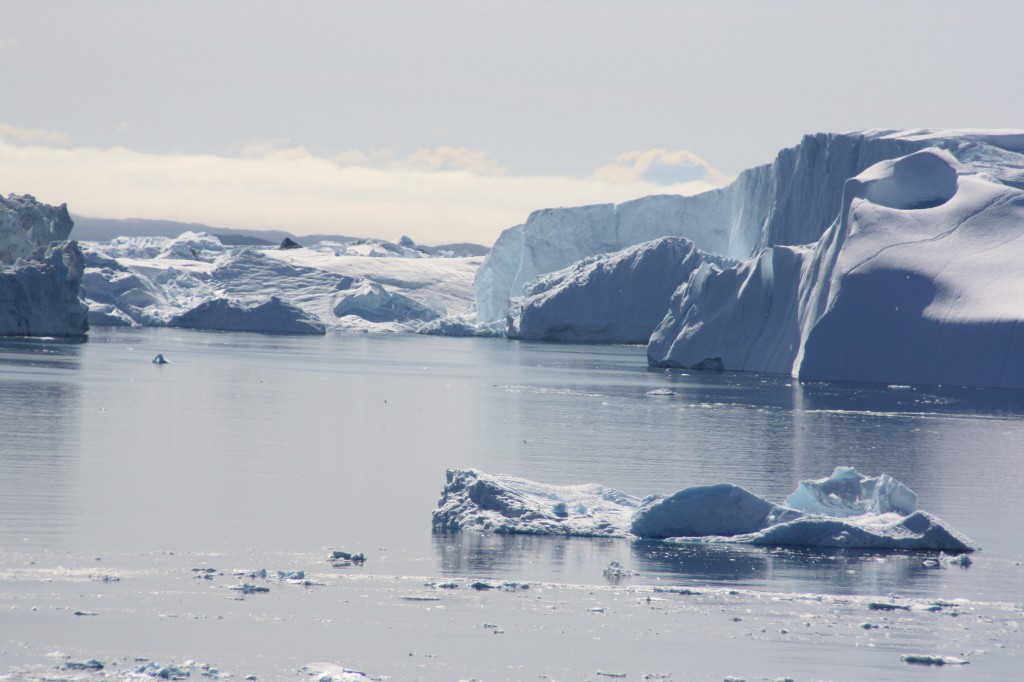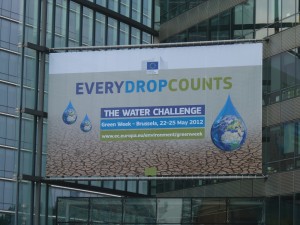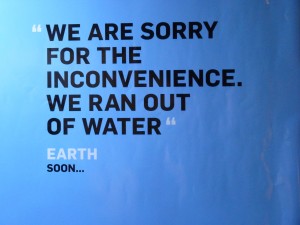Search Results for Tag: EU
Climate talks and linguistic finesse
Do you know the feeling when you read minutes or an account of a meeting and wonder if the person who wrote it was actually at the same event as you? Subjective perceptions are often very different, and that is even more the case when it comes to international negotiations about climate change. I remember when the last head of the UNFCCC Yvo de Boer resigned in the wake of the Copenhagen climate talks fiasco, I wrote a commentary entitled “No job for an optimist”. Maybe I should have turned it around to “optimism essential” – or at least keeping a positive attitude and repeatedly sending out positive signals no matter how frustrating the process is.
![]() read more
read more
Climate adaptation or building resilience (and does it matter?)
Four weeks away from the Rio Summit, the impression I’ve been getting here at Green Week in Brussels has not been one of great optimism on the part of the EU experts involved in the preparations. The EU says it’s going for ambitious targets, but has no reason to assume that others are going to follow suit. EU Director General for environment Karl Falkenberg say’s next week’s meeting in New York for the last round of pre-Rio negotiations will be an “uphill challenge”. The Danish Environment Minister Ida Auken (Denmark currently has EU Presidency) wants to have a global goal on water. We need to take all 3 aspects of sustainability into account, says Auken. The social, environmental and economic impacts. Yes, yes, yes!. Let’s see what will actually come out of Rio.
![]() read more
read more
Earth – Closed for shortage of water?
I’m in Brussels at the moment for the EU’s annual environment policy conference, the Green Week. Every Drop Counts: Water is the focus this year, in keeping with 2012 as International Water Year and in the run-up to the earth summit in Rio in June. Once again the message is that water is involved in or affected by just about all our human activities. So protecting our water supplies has to be a part of policies on agriculture, energy or urbanisation. And it has to be tackled globally. And as consumers of products that have a huge water footprint, we consumers have a role to play. Everybody is calling for a networked approach, looking at the nexus of water, energy, food security. This is a recurrent theme at environment gatherings I’ve attended over the past year. Is this thinking finding its way into policy and practice, I wonder?
A growing population and rapid climate change are putting our water supplies under huge pressure. One speaker said that as early as 2030 the world’s demand for freshwater will exceed supply by around 40% and 50% of the world’s population will live in regions with water shortages. Shocking? More later between sessions.
And if you’re interested in the organisation whose water shortage poster at the stand is on the photo, you’ll find it at formatoverde Their business is education for sustainability. The link is to the English website.
Climate networking in Budapest

I am in Budapest, the capital of Hungary, which currently holds the EU Presidency. An attractive city, these give a brief impression, taken during my coffee break.

The European Journalism Centre on behalf of the European Commission is holding a conference for journalists here. Today we were focusing on energy and climate and in particular the EU’s new road map for “moving to a competitive low-carbon economy in 2050″, which was released last week.
It’s really interesting to meet and network here with so many journalists from eastern and central European countries and to hear their different perspectives on climate change and communicating it. Both informally on the sidelines and during the sessions, the huge differences in living standards and finances between some countries become available. One colleague said it was impossible to persuade poor farmers or other rural residents in Roumania to invest in insulating their houses to make them more “climate friendly“ when they didn’t even have the money to buy fuel to heat their homes in the first place.
So when it comes to the EU’s proposed road map for reducing fuel consumption, clearly the views in different regions are going to be very different. So are the media and attitudes towards environmental issues in general.
Artur Runge-Metzger is the Director of the DG Climate Action for the European Commission. He presented the new plan, which he stresses is in no way binding, but designed to provoke debate.

It sets out ways key economic sectors could achieve an overall 80% reduction in the EU’s emissions by 2050 (compared to 1990). The member states will be discussing and evaluating it between now and June.It will also be interesting to see how different industries and businesses react. The positive thing is, I find, it stresses that it is possible to be competitive while still reducing emissions (admittedly using some technologies not everybody would accept as safe and clean, more later)
WWF’s Director of Global Energy Stephan Singer is also here. He welcomed the road map as a good start but (as you might expect) said it was “too timid”. He sees it as positive that the EU has come out with a document like this at all and that it focuses on domestic measures to reduce emissions.
The EU’s figures of course include nuclear and were published just before the Japanese reactor accidents. I had to ask the question of how the disaster is affecting the EU’s approach. At fist Mr Runge-Metzger was reluctant to answer, saying the Commission respects the member states’ individual policies on this. But later he told me of course the accident was putting a new spotlight on nuclear and might well influence some countries to change their minds. It clearly changes the situation.
In a talk with my colleague Pavel Antonov, a Bulgarian journalist now researching into climate change and the media, he drew my attention to a comment in the Guardian by George Monbiot. I was flabbergasted when I read it. He has changed tack and says he is now for nuclear because the side-effects of the disaster have not been too bad, considering. I find that unbelievable and I think it is too early to come out with that. Or are you just trying to provoke us George? The latest press release I just received from Greenpeace expresses deep concern about the radioactive contamination of Tokyo’s drinking water and the official information policy surrounding the accident. These are very difficult times all round. More tomorrow. Tonight we have a discussion on covering climate change in the media and differences in different media, different countries, etc.
Cancun: just keep the ball rolling?

This week I spent three days in Brussels at a “Climate Action Conference” organised by the European Journalism Centre and the European Commission for Climate Action, finding out about the European Union’s perspective on the Cancun climate talks (29.11-10.12.2010). It was a great opportunity to find out first-hand from the European Commissioner for Climate Action Connie Hedegaard and some of the other top players in the field what the EU expects – and does not expect of the talks. It was also sobering at times –to hear their views and other experts’ assessments (from ngos, business and the media) of the EU’s position in the global climate game and, indeed, on the prospects for halting climate change in general. In a nutshell, I’d sum it up as: the Europeans have done their bit in the past and are still moving ahead, but even if they upped their targets further: without major emissions reductions from the USA and China, it would not make a lot of difference, and the 2° goal will not be reached.

Connie Hedegaard makes no bones about the fact that Cancun is unlikely to bring the binding global climate agreement the world once hoped would come out of last year’s Copenhagen talks. She says the main thing is to “keep up the momentum in the international climate negotiations”, with a view to pursuing an agreement at the next UN climate conference in South Africa. She does hope for clear decisions to halt deforestation (by improving incentives) and to make sure the fast-track financing promised at last year’s talks will actually be delivered. She talks about “cashing in on the Copenhagen Accord pledges”. You’ll be able to hear and read her views in more detail in the not-too-distant future on the Deutsche Welle Environment page and the radio programme Living Planet. On the whole, though, she seems to be keen to make sure this time round expectations of the talks are not too high. Given the overall mood, I don’t think any of us would have to worry too much about that, agreed? As British MEP Chris Davies told me at the conference, it’s hard to find anybody who’s optimistic about Cancun. Or is there anybody out there with a more positive view? (And is there any alternative?)
Clearly, the failure of the Obama administration to get their climate legislation through in the USA is a major obstacle to progress. The people at the Brussels conference with me were depressed to hear Professor Jeffrey Sachs, Director of the Earth Insitute at Columbia University, who joined us for a video conference, say he saw absolutely no hope for a turnaround in the US position in the foreseeable future. He presented a scenario he would welcome (but which he admitted does not look overly likely) where the Chinese would take the initiative and consolidate their leading position on climate-friendly technologies and drastically reduce emissions, conscious of their country’s strong vulnerability to climate change. With the Europeans and emerging countries doing “their bit”, the USA would ultimately follow suit.
Various speakers, including Commissioner Hedegaard, noted positive signs coming out of China with regard to climate awareness and policy. Kelly Rigg, from the tcktcktck initiative, was amongst them. She was actually one of the more optimistic people at the Brussels meeting. You will find her views on what she sees as a “changing climage” with regard to awareness and willingness to act on climate change, on the tcktcktck blog.
I have to take issue with you on your blanket criticism of the media, though, Kelly. Undoubtedly, there is a lot of bad journalism of the kind you attack out there and I agree with a lot of what you say about how the situation can be distorted when the principle of always giving “the other side of the story” results in giving 50% of the coverage to a small minority of critics. But don’t forget there are plenty of journalists among us who go to great lengths to give fair, adequate and unbiased coverage to climate science and impacts around the globe. And a lot of them were listening to your speech at the Brussels meeting.























Feedback